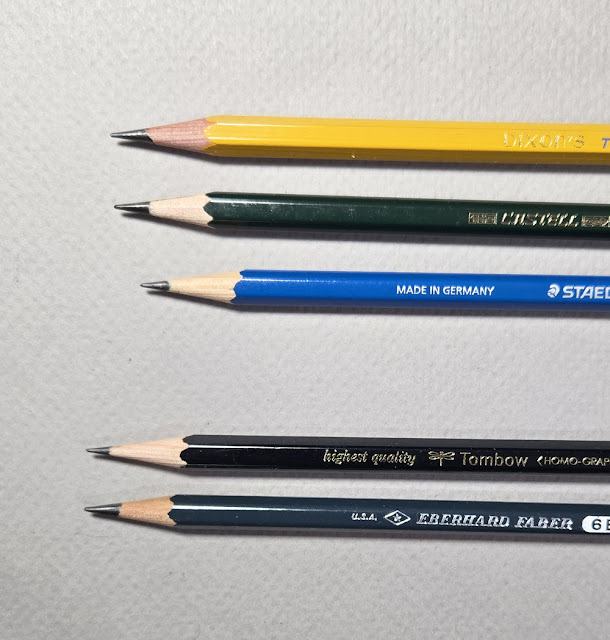 |
| My picks, from top: Dixon's Typhonite Eldorado, Faber-Castell 9000, Staedtler Mars Lumograph. The other two didn't make the cut. |
 |
| 11/27/24 Faber-Castell 9000 8B |
The question came up during Pencilvember while I was using a Faber-Castell “Castell” 9000 pencil for a draped scarf study. For a graphite sketch, I typically use one hard grade to begin, then finish with a softer grade. In the case of a full-on, finished drawing, I might use several grades in between. But I was in a hurry that day with only 20 minutes before I had to leave for an appointment, so I tried an experiment: Instead of my typical method, I used only the F-C 9000 in 8B.
I know 8B sounds way too soft, and I thought it would be challenging to draw the initial blocking and lightest values with a pencil that dark. In fact, it is very strangely both hard and soft. While the end result is not as smooth as it might have been had I started with a harder grade, I was happy with it – both the result and the process. Because the entire 9000 range is so hard (compared to any Japanese range and probably even some European ranges), the 8B was suitably hard while also being dark. Huh – I wouldn’t even mind taking it to Gilligan’s Island.
 |
| 11/29/24 Dixon Typhonite Eldorado 3B |
Multiples and variations must be minimized. Anticipating a potential rescue, the Skipper tells the castaways that they may bring only the “bare essentials” (a term that makes Mrs. Howell gasp and adolescent 1960s viewers titter). Ginger’s 15 evening gowns would not make the cut, and neither would a full range of graphite pencils.
In addition to being compact, each choice must be versatile. If one colored pencil can take the place of two (oooh, bicolors!), that’s great, but if it’s also a watercolor pencil, all the better. The double-sided Viking Verso would be an ideal graphite choice – if only I liked the scratchy graphite.
Practical matters must also be considered. One could make the argument that a clutch and a box of leads in a variety of grades would certainly be a compact graphite set for the island. But how practical would it be to continually change the lead in a clutch while making a drawing? Not at all. I’d be rescued by the time I finished that sketch.
Finally, a subjective criterion is also important. I must enjoy using the pencil, or being stranded for any length of time would be intolerable.
 |
| 12/1/24 Staedtler Mars Lumograph 2B |
My top three candidates are the vintage Dixon’s Typhonite Eldorado 3B, the previously mentioned Faber-Castell 9000 8B, and the Staedtler Mars Lumograph 2B. Each is simultaneously hard and dark, making them versatile, compact pencils. The Lumograph is not as smooth and pleasant to use as the Eldorado or 9000, but it does meet the criteria. The Lumograph and the 9000 have the advantage of being readily available almost anywhere (except the Island, of course) compared to the vintage Eldorado (though it can be found often enough on eBay).

12/2/24 Tombow Mono F: Too hard.
Although I had doubts, I tested a long-time favorite pencil to see how it would fare: A Tombow Mono F. Sometimes I start graphite drawings with this F as my
first, hardest grade, then finish with a softer grade or two. Unfortunately, it's not soft enough to finish a sketch, at least with my patience level, because it
takes too long to build up the darkest darks. (Who’s got that kind of time when
there are coconuts to pick?)
My search was by no means exhaustive; I probably have other pencils that would pass the Gilligan test. These were simply the ones that were fresh in my memory from this year’s and last year’s Pencilvember. What are your graphite candidates for Gilligan’s Island?
 |
| 12/2/24 vintage Eberhard Faber Microtomic 6B: Too soft. |
 |
| All pencils were freshly sharpened before making the test sketches. This image shows how the points looked after the sketches were finished. |
These fabric sketches look very meditative to do and look at. I am looking forward to seeing what your “Gilligan's Island” pen and color choices will be!
ReplyDeleteDraped fabric is probably the most relaxing, meditative subject I have ever drawn!
Delete"What are your graphite candidates for Gilligan’s Island?" I'd sooner drown than try to survive with fewer than 4 grades of Mitsubishi's exquisite Hi-uni pencils! (They're wooden — perhaps they would offer some flotation?)
ReplyDelete~ David Miller
Keep your Hi-Unis hidden, and perhaps you'll sneak past the Skipper! ;-)
DeleteI think the technalo - B would work for me. I wonder if seawater gives it a different look?
ReplyDeleteTabby
Technalo is an interesting choice! I'll get mine out and take a look. Don't worry about seawater... you can make a protective case out of coconut shells (that seems to be the Island's primary raw material 🤣).
DeleteAnd if you were not needing to use the coconuts for a case you could make a horse!
DeleteTabby
I would just take Faber-Castell’s The Perfect Pencil because it is a 9000 with an eraser and a cap with a clip and a built-in sharpener.
Delete